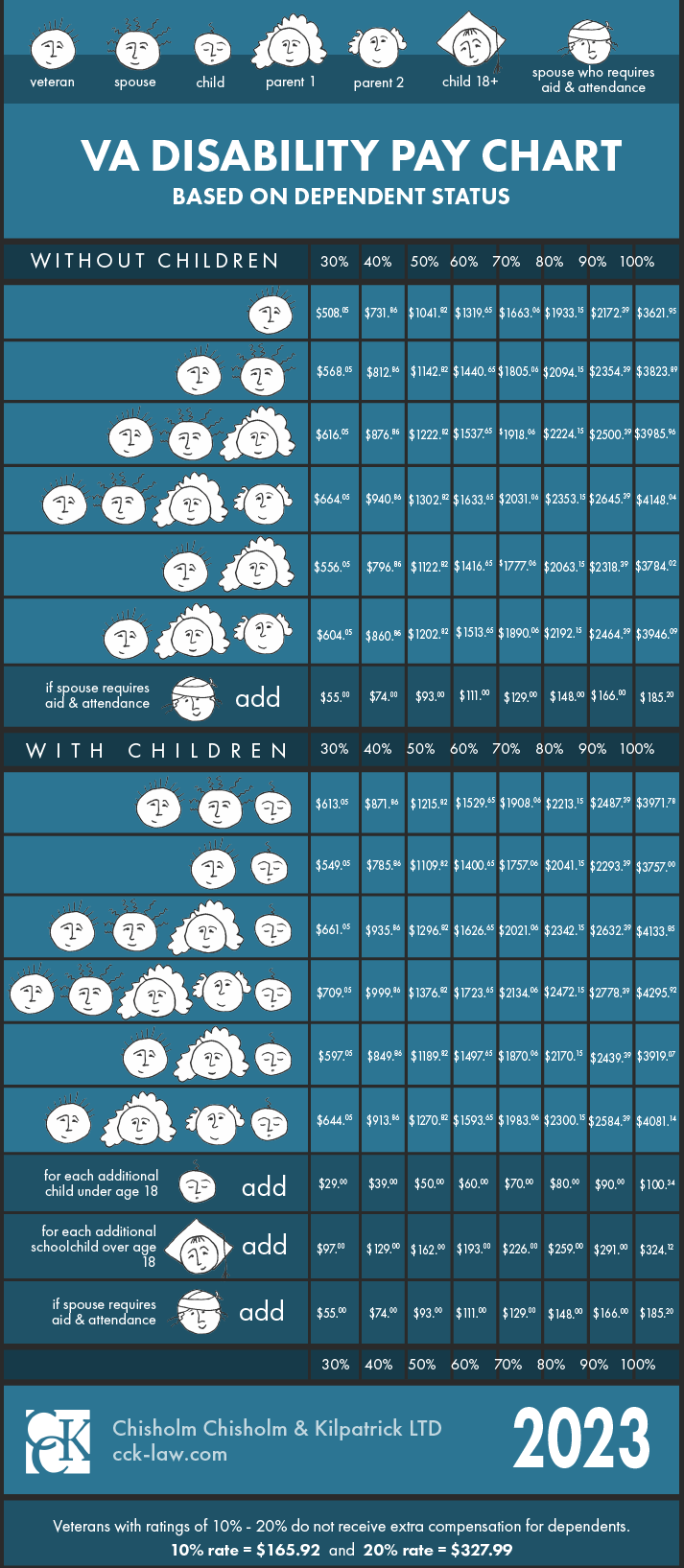60% Disability Rating, Benefits, and Pay

CCK Law: Our Vital Role in Veterans Law
Veterans who have been injured or disabled because of their military service are eligible for VA disability compensation benefits. In order to receive benefits, veterans must first be assigned a disability rating. This rating will correspond to the amount of monthly compensation the veteran will receive. Continue reading to learn more about the benefits available to veterans who are rated at 60 percent.
What are VA Disability Ratings?
Disability ratings are assigned based on the severity of a veteran’s disability. To assign ratings, VA uses the Schedule for Rating Disabilities. This outlines the criteria for each rating and how conditions will be evaluated. Specifically, the criteria list symptoms, and sometimes treatments, relevant to specific conditions and designates the rating that should be assigned accordingly.
Ratings are assigned in percentages ranging from 0 to 100, typically in 10 percent increments.
VA disability ratings are meant to compensate veterans for the average impairment in earning capacity caused by their service-connected condition(s). As such, the more severe the disability, the higher the VA disability rating.
How Much Compensation Do Veterans Rated at 60% Receive?
As of December 1, 2023, veterans who are rated at 60 percent will receive $1,361.88 per month. However, this amount typically changes each year to reflect changes in the cost-of-living.
Below is the amount of compensation awarded for each percentage:
- 0 percent disability rating: $0.00 per month
- 10 percent disability rating: $175.51 per month
- 20 percent disability rating: $346.95 per month
- 30 percent disability rating: $537.42 per month
- 40 percent disability rating: $774.16 per month
- 50 percent disability rating: $1,102.04 per month
- 60 percent disability rating: $1,395.93 per month
- 70 percent disability rating: $1,759.19 per month
- 80 percent disability rating: $2,044.89 per month
- 90 percent disability rating: $2,297.96 per month
- 100 percent disability rating: $3,831.30 per month
Veterans can also receive additional compensation for qualifying dependents, including a spouse, child under the age of 18, child between the ages of 18 and 23 and still in school, a child who was permanently disabled before the age of 18, and dependent parents.
60 Percent Disability Benefits for Veterans with Dependents
Below are the rates payable for various scenarios when a veteran is rated at 60 percent:

What Other Benefits Are Available to Veterans Rated at 60 Percent?
In addition to VA disability compensation, veterans rated at 60 percent may be eligible for additional benefits, including, but not limited to:
- Special Monthly Compensation
- Veterans Benefits Banking Program
- Travel allowances for VA Medical Center appointments
- Disabled Veterans Property Tax exemptions, in some states
- VA’s home loan program
- Dependents Educational Assistance
- CHAMPVA Medical Insurance

Are Veterans Rated at 60 Percent Eligible for TDIU?
Total disability based on individual unemployability (TDIU) is a monthly benefit available to veterans who are prevented from gaining or maintaining substantially gainful employment. This benefit compensates veterans at the 100 percent level, even if their combined disability rating is less, such as at 60 percent.
In order to be eligible for schedular TDIU, veterans must:
- Have one condition rated at 60 percent minimum, OR two conditions that can be combined to reach at least 70 percent, where one condition is at minimum 40 percent.
Veterans who are rated at 60 percent for one condition meet these criteria. As such, if the veteran is prevented from working because of their service-connected disability rated at 60 percent, they should be eligible for TDIU benefits.
To apply for TDIU, VA requires that veterans complete VA Form 21-8940, Veteran’s Application for Increased Compensation Based on Unemployability.
About the Author
Share this Post
